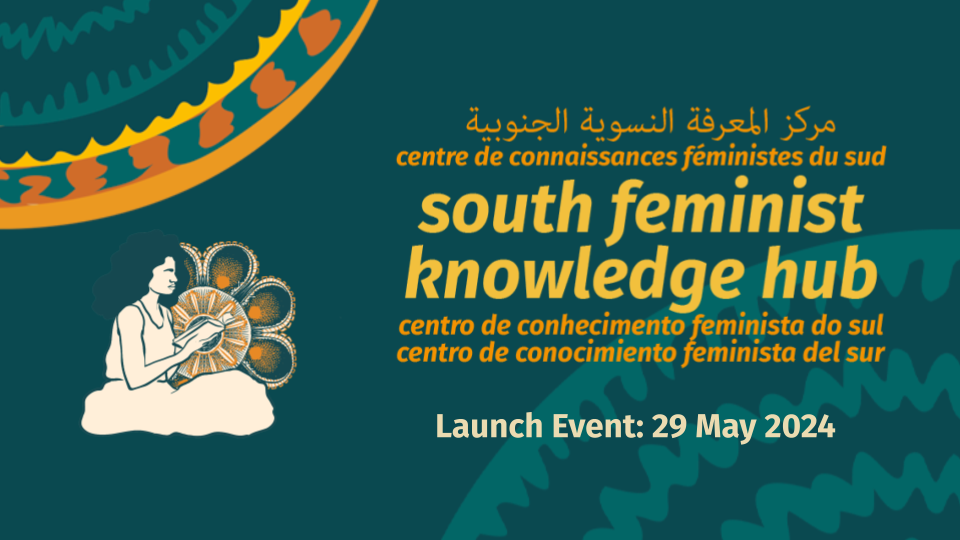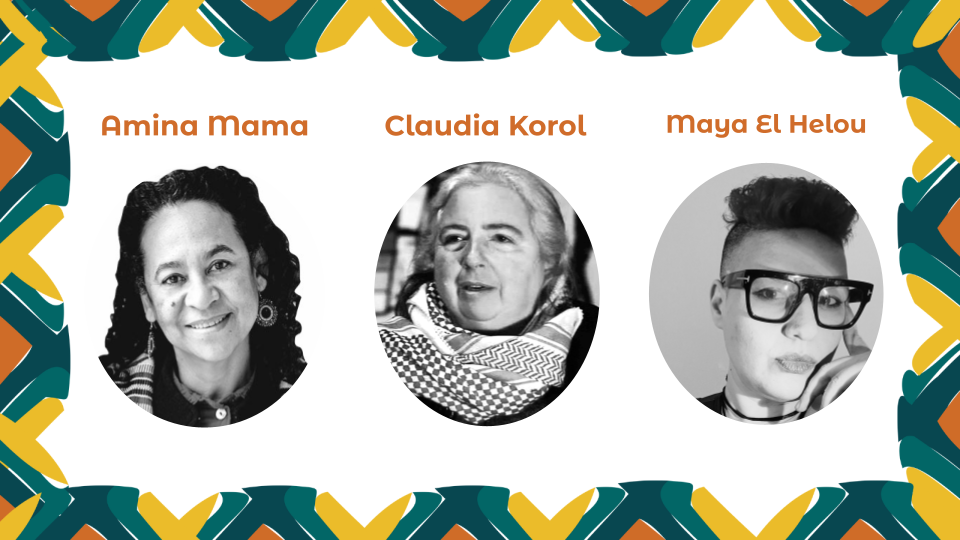
On May 29, 2024, we officially launched the South Feminist Knowledge Hub (SFKH), the first platform dedicated exclusively to archiving and revealing feminist knowledge from the Global South.
The South Feminist Knowledge Hub is a collective act of resistance against the erasure of our knowledge. Southern feminists have long been producing rich, radical knowledge through our struggles, creativity, and organising – but this knowledge is often fragmented, dismissed, or made invisible by colonial systems.
This Knowledge Hub is a living archive that brings together theory, memory, and praxis from across the South. It’s a space to reclaim, remember, and reimagine: centering the voices, experiences, and wisdoms of Southern feminists. It invites us to build new knowledge genealogies – in defiance of colonial, patriarchal knowledge systems and grounded in our own truths.
The launch of the South Feminist Knowledge Hub on May 29, 2024, brought together Southern feminist thinkers and activists to reflect on why and how we build and protect our knowledge. To celebrate the launch, we invited Amina Mama, Claudia Korol, and Maya El Helou to discuss the production of feminist knowledge in the Global South, including paradigms, traditions, erased, forgotten, and marginalised knowledge, knowledge preservation, memory construction, and its relationship with feminist activism and liberation struggles.

The speakers led a powerful conversation on Southern feminist knowledge traditions – including African, decolonial, and community feminism – and the ways they are erased, preserved, and practised through activism, education, and memory work. There was active acknowledgement of the ongoing genocide in Palestine, anchoring the dialogue in the context of historical colonial violence. They reminded us that feminist knowledge cannot be separated from our lived struggles and that the Knowledge Hub is a political tool for sustaining memory, building resistance, and strengthening transnational solidarities.
We are deeply grateful to our speakers for their powerful contributions! Below are some of the reflections they shared:
Amina Mama on the political relevance of the Knowledge Hub for Southern Feminist movements and activism:
“Why do we need a South feminist Knowledge Hub if not to provide a site that can bring together the subaltern, insurrectionary and rebellious feminist knowledge? South feminist knowledge work excavates, restores, critiques, and transforms prevailing knowledge hegemonies. Feminist research has been going on independently at multiple locations over many decades, yet it remains scattered, and we know very little of each other’s struggles and strategies.
Gathering feminist knowledge from across the Global South will enable us to collectively empower ourselves, to theorise collectively, to better confront global epistemic domination, and to overcome the challenges posed to transnational solidarities by language, time, and distance. Curating a knowledge resource that brings people’s knowledge together across borders without being mediated by the West is in itself subversive, and creating our own knowledge platform allows us to gather ourselves and our ideas and to access knowledge….”
Claudia Korol on how indigenous communities and popular knowledge production are challenging the deadly system of the Eurocentric patriarchal capitalist hegemony of the North:
“We are living through a historic moment that favors neo-colonial thought, the fragmentation of theory and practice, and blocks access to scientific and technological knowledge for the popular classes. Wise women of the people are persecuted. Defending popular wisdom is part of feminist knowledge-making.
Indigenous peoples and social movements create knowledge rooted in communities, challenging the Eurocentric, patriarchal, capitalist hegemony of the North. This knowledge is a political and pedagogical tool against a deadly system dominated by corporations. Strengthening popular knowledge is a way to defend life. It is urgent to create spaces and paths where the seeds of a new era can germinate.
We need revolutionary proposals and knowledge-building processes that go beyond dialogue and transmission, to foster the collective creation of new knowledge. We must shake up what has been imposed on us…”
Maya El Helou on knowledge, resistance, and authoritarian regimes:
“Do you know, the first thing a tyrant does when it comes to knowledge, when they get into the reign and they’re ruling a country? The first thing they do is erase or conceal the country’s archives. They conceal the histories of liberation or any form of resistance – because knowledge is dangerous. Knowledge production scares tyrants.
Knowledge production is a horror story for those who want to mislead the public on information, on history, and try to manipulate the imagination of the people in particular. We can see this right now with Palestine and what it is like. The Israeli settler colonial state, the Zionist state, is trying to conceal and mislead the public into a lot of misinformation to keep the genocide going.
We are in the presence of genocide, and we are at war with information, but we are always at war as feminists. We are at war with capitalism, with world powers, with patriarchy, with settler colonialism. We are at war with ourselves, even sometimes, especially when we try to write or illustrate or do anything where we share our knowledge with the world, but knowledge as we know it takes different forms….”
You can watch the launch here in the original language. If you need Arabic, English, French, Portuguese, or ISL interpretations, contact us at knoweldgehub@southfeministfutures.org.
We encourage you to:
In solidarity and joy,
South Feminist Futures Team